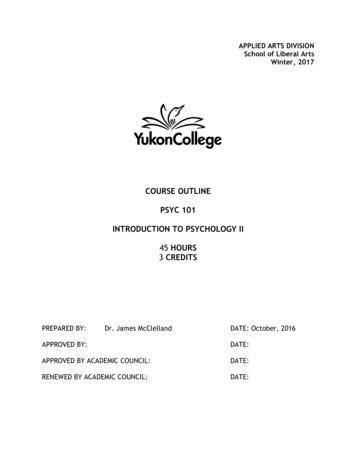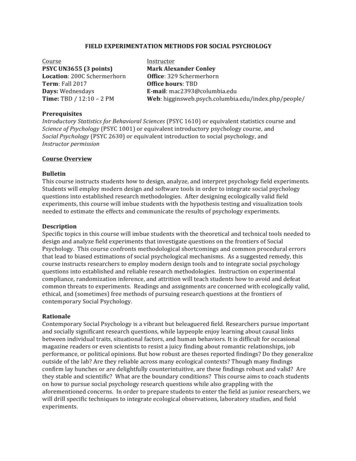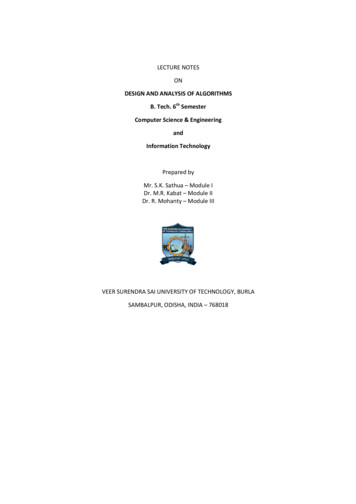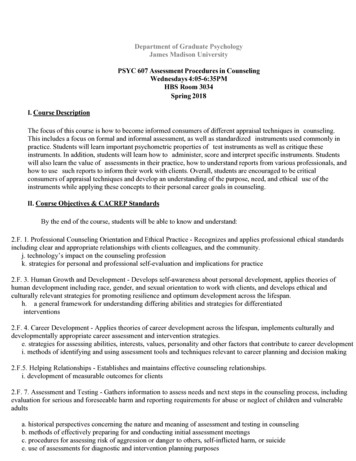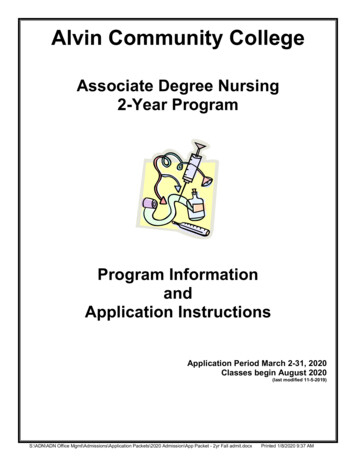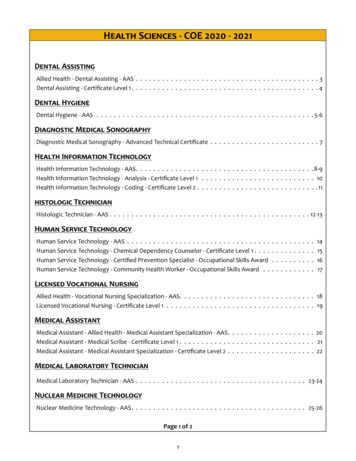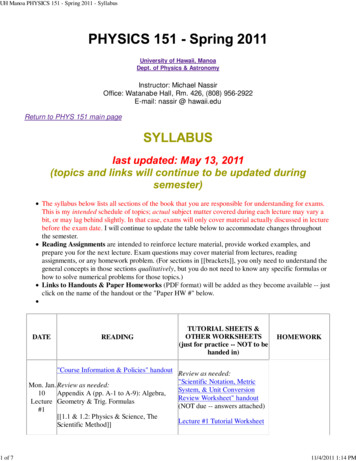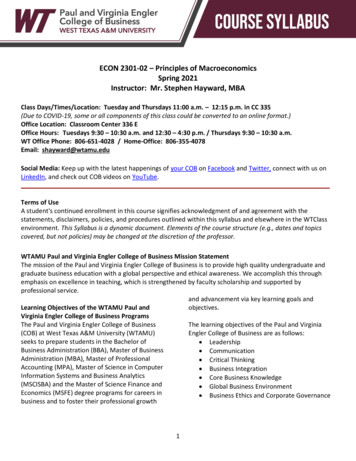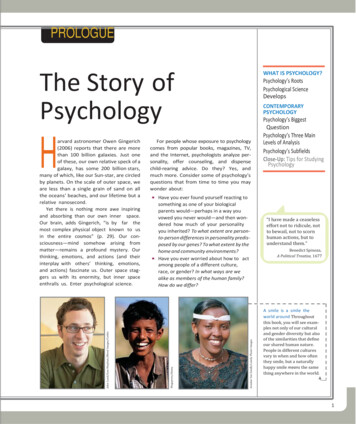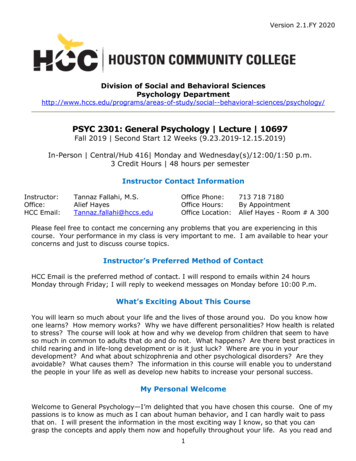
Transcription
Version 2.1.FY 2020Division of Social and Behavioral SciencesPsychology udy/social--behavioral-sciences/psychology/PSYC 2301: General Psychology Lecture 10697Fall 2019 Second Start 12 Weeks (9.23.2019-12.15.2019)In-Person Central/Hub 416 Monday and Wednesday(s)/12:00/1:50 p.m.3 Credit Hours 48 hours per semesterInstructor Contact InformationInstructor:Office:HCC Email:Tannaz Fallahi, M.S.Alief HayesTannaz.fallahi@hccs.eduOffice Phone:Office Hours:Office Location:713 718 7180By AppointmentAlief Hayes - Room # A 300Please feel free to contact me concerning any problems that you are experiencing in thiscourse. Your performance in my class is very important to me. I am available to hear yourconcerns and just to discuss course topics.Instructor’s Preferred Method of ContactHCC Email is the preferred method of contact. I will respond to emails within 24 hoursMonday through Friday; I will reply to weekend messages on Monday before 10:00 P.m.What’s Exciting About This CourseYou will learn so much about your life and the lives of those around you. Do you know howone learns? How memory works? Why we have different personalities? How health is relatedto stress? The course will look at how and why we develop from children that seem to haveso much in common to adults that do and do not. What happens? Are there best practices inchild rearing and in life-long development or is it just luck? Where are you in yourdevelopment? And what about schizophrenia and other psychological disorders? Are theyavoidable? What causes them? The information in this course will enable you to understandthe people in your life as well as develop new habits to increase your personal success.My Personal WelcomeWelcome to General Psychology—I’m delighted that you have chosen this course. One of mypassions is to know as much as I can about human behavior, and I can hardly wait to passthat on. I will present the information in the most exciting way I know, so that you cangrasp the concepts and apply them now and hopefully throughout your life. As you read and1
Version 2.1.FY 2020wrestle with new ideas and facts that may challenge you, I am available to support you. Thefastest way to reach me is by my HCC email. The best way to really discuss issues is inperson and I’m available during posted office hours to tackle any questions you might have.My goal is for you to walk out of the course with a better understanding of yourself and ofhuman behavior. So please visit me or contact me whenever you have a question.Prerequisites and/or Co-RequisitesPSYC 2301 requires college-level reading and writing skills. Research indicates that you aremost likely to succeed if you have already taken and passed ENGL 1301. The minimumrequirements for enrollment in PSYC 2301 include placement in college-level reading (or takeINRW 0420 or ESOL 0360 as a co-requisite). If you have enrolled in this course havingsatisfied these prerequisites, you have a higher chance of success than students who havenot done so. Please carefully read and consider the repeater policy in the HCCS StudentHandbook.Canvas Learning Management SystemThis section of PSYC 2301 will use Canvas (https://eagleonline.hccs.edu) to supplement inclass assignments, exams, and activities. Resources posted in Canvas include the Final ExamHandbook, a list of objects and key terms that are covered on the ComprehensiveDepartmental Final Exam.HCCS Open Lab locations may be used to access the Internet and Eagle Online Canvas. It isrecommended that you USE FIREFOX OR CHROME AS YOUR BROWSER.HCC Online Information and PoliciesAlthough this is an in-person class, I encourage you to visit the HCC Online informationpages. They contain a great deal of useful information about using Canvas. Here is the link toHCC Online: http://www.hccs.edu/online/.Scoring Rubrics, Assignment Instructions, etc.Look in Eagle Online Canvas for the scoring rubrics for assignments, assignment instructions,exam instructions, and other information to assist you in the ructional MaterialsTextbook InformationThe textbook listed below is required for this course. The Scienceof Psychology (4th edition) by Laura King (McGraw-Hill).A package that includes the text as well as an access code forMcGraw-Hill Connect (ISBN 9781260198805) may be purchasedthrough the HCC Bookstore’s website.2
Version 2.1.FY 2020Temporary Free Access to E-BookStudents can get free access to a digital version of the textbook for a limited period of time.Here’s how to get access. t-access.Enter your email address to begin the registration process.Other Instructional ResourcesCourseware“Courseware” is a premium website designed to accompany a specific textbook that includespractice quizzes, videos, and other useful study tools. The courseware that accompanies therequired text in this class is McGraw-Hill Connect. It is not required in this class, but youmay find it to be a helpful resource.TutoringHCC provides free, confidential, and convenient academic support, including writing critiques,to HCC students in an online environment and on campus. Tutoring is provided by HCCpersonnel in order to ensure that it is contextual and appropriate. Visit the HCC TutoringServices website for services provided.LibrariesThe HCC Library System consists of 9 libraries and 6 Electronic Resource Centers (ERCs) thatare inviting places to study and collaborate on projects. Librarians are available both at thelibraries and online to show you how to locate and use the resources you need. The librariesmaintain a large selection of electronic resources as well as collections of books, magazines,newspapers, and audiovisual materials. The portal to all libraries’ resources and services isthe HCCS library web page at http://library.hccs.edu.Supplementary InstructionSupplemental Instruction is an academic enrichment and support program that uses peerassisted study sessions to improve student retention and success in historically difficultcourses. Peer support is provided by students who have already succeeded in completion ofthe specified course, and who earned a grade of A or B. Find details ts/supplemental-instruction/.Course OverviewPSYC 2301 is a survey course of the basic principles underlying human behavior. Emphasis isplaced on major areas of study in the field of psychology, such as motivation, development,thought processes, and personality. (PSYC 2301 is included in the Psychology Field of Study.)Core Curriculum Objectives (CCOs)PSYC 2301 satisfies the social science requirement in the HCCS core curriculum. The HCCSPsychology Discipline Committee has specified that the course address the following coreobjectives: Critical Thinking: Students will demonstrate the ability to engage in inquiry andanalysis, evaluation and synthesis of information, and creative thinking by completinga written assignment such as a book report, research paper, or essay.3
Version 2.1.FY 2020 Communication Skills: Students will demonstrate effective development,interpretation and expression of ideas through written, oral, and visual communicationby completing a written assignment such as a book report, research paper, or essay.Quantitative and Empirical Literacy: Students will demonstrate the ability to drawconclusions based on the systematic analysis of topics using observation, experiment,and/or numerical skills by completing textbook reading assignments, completingassignments, and answering questions on quizzes and exams.Social Responsibility: Students will demonstrate cultural self-awareness,intercultural competency, civil knowledge, and the ability to engage effectively inregional, national, and global communities by completing textbook readingassignments, completing assignments, and answering questions on quizzes andexams.Program Student Learning Outcomes (PSLOs)Can be found ial--behavioral-sciences/psychology/Course Student Learning Outcomes (CSLOs)Upon completion of PSYC 2301, the student will be able to: Demonstrate knowledge in multiple (8) areas of psychology, including concepts, facts,and theoretical perspectives. Define and identify the basic research and evaluation methods used in psychology,including the strengths and weaknesses of each method. Demonstrate knowledge of and identify concepts related to personal development andthe development and behavior of others. Apply psychological concepts to the solution of issues and problems including ethics,coping with stressful events, health and wellness, parenting, learning, memory, and/or evaluation of media presentations.Learning ObjectivesLearning Objectives for each CSLO can be found at Learning Objectives for PSYC 2301Student SuccessExpect to spend at least twice as many hours per week outside of class as you do in classstudying the course content. Additional time will be required for written assignments. Theassignments provided will help you use your study hours wisely. Successful completion ofthis course requires a combination of the following: Reading the textbook Attending class in person and/or online Completing assignments Participating in class activitiesThere is no short cut for success in this course; it requires reading (and probably re-reading)and studying the material using the course objectives as your guide.4
Version 2.1.FY 2020Instructor and Student ResponsibilitiesAs your Instructor, it is my responsibility to: Provide the grading scale and detailed grading formula explaining how student gradesare to be derived Facilitate an effective learning environment through learner-centered instructionaltechniques Provide a description of any special projects or assignments Inform students of policies such as attendance, withdrawal, tardiness, and make ups Provide the course outline and class calendar which will include a description of anyspecial projects or assignments Arrange to meet with individual students before and after class as requiredAs a student, it is your responsibility to: Attend class in person and/or online Participate actively by reviewing course material, interacting with classmates, andresponding promptly in your communication with me Read and comprehend the textbook Complete the required assignments and exams Ask for help when there is a question or problem Keep copies of all paperwork, including this syllabus, handouts, and all assignments Attain a raw score of at least 50% on the departmental final exam Be aware of and comply with academic honesty policies in the HCCS Student HandbookAssignments, Exams, and ActivitiesPlease carefully review all of the information in this section and don’t hesitate to askquestions if anything is unclear to you. Be assured that I have thoughtfully designed all of theassignments, exams, and activities in this course to enable you to learn the material and tobe successful. By providing due dates, I am helping you stay on track and accomplish yourgoal of getting the best grade you can in this course.Written Assignment(s)What are “Core Chapters” and “Non - Core Chapters”?Core chapters are those that contain information that is covered on the ComprehensiveDepartmental Final Exam. They include Chapters 1, 2, 3, 6, 7, 9, 12, 15, 16, and 17. Theinformation in each chapter that appears on the exam is listed in the Final Exam Handbook.You will find it at the link wWritten Assignment: Non-Core Topic Summary (200 points) Choose one of these topics from Chapter 5, 8, 10, 11, or 13.o Chapter 5: Hypnosiso Chapter 8: Intelligenceo Chapter 10: Approaches to Motivation in Everyday Lifeo Chapter 11: Sexual Orientationo Chapter 13: Intergroup Relations5
Version 2.1.FY 2020ooooWrite a summary of the topic that includes all of the main points in thetextbook.Minimum length: 500 wordsMust be typed and double-spacedGrading RubricScore200CompletionThe answer iscomplete.AccuracyAllinformationprovided isaccurate.ComprehensionContentdemonstrates adeepunderstandingof, andengagement withmaterial.OrganizationContent isWellorganized andeasy to read.Points follow alogicalprogression.MechanicsNo majorgrammatical orspelling errors. Nomore than twominor errors.175The answer ismissing slightdetails.Allinformationprovided isaccurate.ContentDemonstratesunderstandingof, andengagementwith, thematerial.Content isWell organized andeasy to read.Points follow alogicalprogression.No majorgrammatical orspelling errors. Nomore than fiveminor errors.150The answer ismissingmultipledetails.MostInformationprovided isaccurate.Contentdemonstratesbasicunderstanding ofthe material.Some major andminor errors thatdon’t necessarilyimpaircommunication.125Contentsuggests lackof preparationorcomprehension.Someinformationprovided isaccurate.Contentdemonstratesless than basicunderstanding ofthe material.100Content onlyMarginallyrelated to thequestion.A smallamount oftheinformationis accurate.Contentdemonstrates alack ofunderstanding ofthe text(s).Content isorganized andeasy to read.Points follow amostly logicalprogression.Content mayBeunorganizedand difficult toread. Points donot follow asolidly logicalprogression.Content isunorganized,illogical, anddifficult toread.75Content fails tomeet the basicrequirements ofthe task.None of theinformationprovided isaccurate.Contentdemonstrates acomplete lack ofunderstanding ofthe material.Content isvery poorlyorganized,illogical, anddifficult toread.Multitude of majorand minor errorsmakes answerincomprehensible.6Major and minorerrors significantlyweaken quality ofcommunication,although stillcomprehensible.Communicationseriously impairedby multitude ofspelling/grammatical errors.
Version 2.1.FY 2020Exams Five examso Exam 1: Chapters 1, 2o Exam 2: Chapters 3, 6o Exam 3: Chapters 7, 9o Exam 4: Chapters 17, 12o Exam 5: Chapters 15, 1650 multiple–choice questions on each examEach question counts 2 points100 points total for each examNo makeup exams are allowed, but each student’s lowest exam grade will be dropped.Exams count 400 pointsIn-Class Activities Eleven in-class activitiesMost will be completed in groupsEach activity will count 10 pointsStudents must be present to get credit. No makeup activitiesEach student’s lowest in-class activity grade will be droppedIn-Class Activities count 100 pointsOther Assignments and ActivitiesNone.Practice Final ExamTo help you get ready for the final exam, I will require you to take a practice final exam. Students must provide Scantron 882 - E – LOVAS100 multiple - choice questionsEach question counts 1 pointExam must be completed in classMakeup exams available only to students who provide documentation of anemergency.The practice final will count 100 points.Comprehensive Departmental Final ExamAll students will be required to take a comprehensive departmental final exam consisting of100 multiple- choice questions. All the information students need to prepare for the exam isin the -2301-departmental-final-exam7
Version 2.1.FY 2020preparation-resources. The exam will be administered in class on the date shown in theCourse Calendar. Students must provide their own Scantron forms (FORM NUMBER 882-ELOVAS). The final exam may not be taken early under any circumstances. The examwill count 200 points.Students must correctly answer at least 50 of the 100 questions on the final exam(50%) to pass the course.Students who are absent from the final exam must discuss their absence with the instructorin advance or within 24 hours afterward. Students who miss the exam and do not discusstheir absence with the instructor within 24 hours will receive a grade of zero andautomatically fail the course.Grading FormulaGrades will be based on total points with a maximum of 1,000 points.Written Assignment(s)ExamsIn-Class ActivitiesPractice Final ExamComprehensive Departmental Final ExamTotalGradeABCDF2004001001002001000Total Points900 800-899700-799600-699 600Incomplete PolicyIn order to receive a grade of Incomplete (“I”), a student must have completed at least 85%of the work in the course. In all cases, the instructor reserves the right to decline a student’srequest to receive a grade of Incomplete.HCC Grading Scale can be found on this site under Academic ent-students/student-handbook/Course CalendarWeek1Dates09/23/1909/25/1909/30/19Second StartTopic/What’s dueAcquainted with Syllabus, and TextbookChapter 1: What Is Psychology?In-Class Activity 1: What Is Psychology?10/02/19Chapter 2: Psychology’s Scientific Method28
Version 2.1.FY 23/1910/28/19Wednesday 10/02/19 - O/E Day ( Census Day )In-Class Activity 2: Research MethodsExam 1Chapter 3: Biological Foundations of BehaviorIn-Class Activity 3: Brain, Nervous System, and Endocrine SystemChapter 6:LearningIn-Class Activity 4: Operant ConditioningExam 2Chapter 7: MemoryIn-Class Activity 5: Structure of Human 01112Chapter 17:Health PsychologyIn-Class Activity 7: Stress and HealthChapter 12: PersonalityIn-Class Activity 8: Defense MechanismsMonday 11/11/19 Last Day to Withdraw11/13/199Chapter 9: Human DevelopmentIn-Class Activity 6: Cognitive DevelopmentExam 311/20/19Chapter 12: Personality cont.In-Class Activity 9: Maslow’s Hierarchy of NeedsExam 411/25/1911/27/19Chapter 15: Psychological DisordersIn-Class Activity 10: Psychological DisordersChapter 16:TherapiesIn-Class Activity 11: Types of g Holiday ( Nov 28 – Dec 1, 2019)Exam 5Final Exam Review - Written Assignment duePractice Final ExamFinal Exam 12:00 – 1:50 p.m.Syllabus and Calendar ModificationsThe instructor reserves the right to modify the syllabus and/or course calendar at any timeduring the semester and will promptly notify students in writing, typically by e-mail, of anysuch changes.Instructor’s Practices and ProceduresMissed Assignments9
Version 2.1.FY 2020See “Comprehensive Departmental Final Exam” and “Written Assignment” above for policiesregarding the final exam and non- core chapter section summary. There are no makeupexams in this course. Instead, each student’s lowest exam grade will be dropped. For in class assignments, students must be present when the assignment is handed out to receivecredit for it. Absent students will receive a grade of zero. However, each student’s lowest in class assignment grade will be dropped. Students who miss the Practice Final Exam willreceive a grade of zero.Academic IntegrityStudents are responsible for conducting themselves with honor and integrity in fulfillingcourse requirements. Penalties and/or disciplinary proceedings may be initiated by collegedistrict officials against a student accused of scholastic dishonesty. “Scholastic Dishonesty”includes, but is not limited to, cheating on a test, plagiarism and collusion. Any instance ofscholastic dishonesty may be reported to the Maxiant system. Possible punishments forscholastic dishonesty include a grade of “0” or “F” on the particular assignment, failure in thecourse, and/or recommendation for probation or dismissal from the college district. Arecommendation for suspension or expulsion will be referred to the college Dean of Studentsfor disciplinary disposition. Students have the right to appeal the decision.It is very important that students follow all of the five fundamental values of academicintegrity including honesty, trust, fairness, respect and responsibility. Students areresponsible for their actions and instructor has the right to report the students in terms ofany scholastic dishonesty. Therefore, all grades and works should result from the student’sown understanding and effort. Please note that possible consequence for cheating,plagiarism, and collusion will be a grade of “F” for that specific assignment.Here’s the link to the HCC information about academic integrity (Scholastic Dishonesty andViolation of Academic Scholastic Dishonesty and dures/Attendance PolicyStudent success is correlated with attendance. I expect you to attend and be prepared foreach class meeting. According to HCC policy, (a) students who do not attend class on orbefore the Official Day of Record shown in the Course Calendar will be dropped; (b)instructors may withdraw students who miss six or more hours of class.Student ConductI expect students to conduct themselves in a courteous, professional, respectful manner atall times. These expectations apply to interactions with the instructor and with otherstudents.10
Version 2.1.FY 2020Instructor’s Course-Specific InformationDuring class meetings and when contacting me by email, please be aware that my preferredmode of address is Professor Fallahi. Students may expect feedback on an exam at the nextclass meeting. Students will receive exam scores but will not be provided with correctanswers. Questions about specific test items should be directed to me by email.Electronic DevicesStudents may not take phone calls during class. Cell phones must be set to silent mode. Theinstructor may ask students to leave electronic devices at the front or rear of the classroomduring exams.Psychology Program InformationVisit the Psychology Program Pages on the HCC Learning Web for information about ourfaculty and courses. You will also find information about majoring in psychology.Psychology Field of StudyThe Field of Study curriculum for Psychology is an 18-credit-hour set of lower division coursesthat must be applied to a bachelor’s degree in Psychology, regardless of degree designation.If a student successfully completes a field of study for an established degree program, thestudent may transfer that block of courses for full academic credit. The transferred field ofstudy courses must be substituted for the receiving institution’s lower-division requirementsfor the discipline degree program into which the student transfers. If a student completesonly part of the field of study, then credit for those courses must also apply toward themajor. neral PsychologyLifespan Growth & DevelopmentStatistical Methods in PsychologySocial PsychologyAbnormal PsychologyBiological PsychologyAssociate in Science in PsychologyHCC students may earn an Associate in Science (A.S.) degree in psychology by completingthe approved degree plan oring-inpsychology-1).Student OrganizationsPsi KappaAll students are invited to join Psi Kappa, an organization that can help students learn aboutpsychology outside the classroom, serve the community, meet students in other PSYCclasses, interact with PSYC faculty, and learn leadership skills.11
Version 2.1.FY 2020Psi BetaHCC has an active chapter of Psi Beta: National Honor Society in Psychology for Communityand Junior Colleges. To learn more about this organization visit the Psi Beta website. Forinformation about the HCC chapter, visit the Psi Beta page on the HCC Learning Web.HCC Foundation: Psychology Achievers ScholarshipTo be eligible for the 125 per semester Psychology Achievers Scholarship, a student must(1) meet all HCC Foundation criteria for scholarship eligibility, and (2) make an A in eitherPSYC 2301 or PSYC 2314.HCC PoliciesHere’s the link to the HCC Student Handbook student-handbook/ In it you will find information about the following: Academic InformationAcademic SupportAttendance, Repeating Courses, and WithdrawalCareer Planning and Job SearchChildcaredisAbility Support ServicesElectronic DevicesEqual Educational OpportunityFinancial Aid TV (FATV)General Student ComplaintsGrade of FXIncomplete GradesInternational Student ServicesHealth AwarenessLibraries/BookstorePolice Services & Campus SafetyStudent Life at HCCStudent Rights and ResponsibilitiesStudent ServicesTestingTransfer PlanningVeteran ServicesEGLS3The EGLS3 (Evaluation for Greater Learning Student Survey System) will be available formost courses near the end of the term until finals start. This brief survey will give invaluableinformation to your faculty about their teaching. Results are anonymous and will be availableto faculty and division chairs after the end of the term. EGLS3 surveys are only available forthe Fall and Spring semesters. EGLS3 surveys are not offered during the Summer semesterdue to logistical ent-students/egls3-evaluate-your-professors/Campus Carry Link12
Version 2.1.FY 2020Here’s the link to the HCC information about Campus s-carry/HCC Email PolicyWhen communicating via email, HCC requires students to communicate only through the HCCemail system to protect your privacy. If you have not activated your HCC student emailaccount, you can go to HCC Eagle ID and activate it now. You may also use Canvas Inbox tocommunicate.Housing and Food Assistance for StudentsAny student who faces challenges securing their foods or housing and believes this mayaffect their performance in the course is urged to contact the Dean of Students at theircollege for support. Furthermore, please notify the professor if you are comfortable in doingso. This will enable HCC to provide any resources that HCC may possess.Office of Institutional EquityUse the link below to access the HCC Office of Institutional Equity, Inclusion, andEngagement ity/)disAbility ServicesHCC strives to make all learning experiences as accessible as possible. If you anticipate orexperience academic barriers based on your disability (including mental health, chronic ortemporary medical conditions), please meet with a campus Abilities Counselor as soon aspossible in order to establish reasonable accommodations. Reasonable accommodations areestablished through an interactive process between you, your instructor(s) and AbilityServices. It is the policy and practice of HCC to create inclusive and accessible learningenvironments consistent with federal and state law. For more information, please go services/Title IXHouston Community College is committed to cultivating an environment free frominappropriate conduct of a sexual or gender-based nature including sex discrimination, sexualassault, sexual harassment, and sexual violence. Sex discrimination includes all forms ofsexual and gender-based misconduct and violates an individual’s fundamental rights andpersonal dignity. Title IX prohibits discrimination on the basis of sex-including pregnancy andparental status in educational programs and activities. If you require an accommodation dueto pregnancy please contact an Abilities Services Counselor. The Director of EEO/Complianceis designated as the Title IX Coordinator and Section 504 Coordinator. All inquiriesconcerning HCC policies, compliance with applicable laws, statutes, and regulations (such asTitle VI, Title IX, and Section 504), and complaints may be directed to:David CrossDirector EEO/ComplianceOffice of Institutional Equity & Diversity13
Version 2.1.FY 20203100 Main(713) 718-8271Houston, TX 77266-7517 or -rights/Office of the Dean of StudentsContact the office of the Dean of Students to seek assistance in determining the correctcomplaint procedure to follow or to identify the appropriate academic dean or supervisor forinformal resolution of laints/speak-with-the-dean-of-students/Department Chair Contact InformationDr. Karen SaenzKaren.Saenz@hccs.edu713-718-703414
PSYC 2301 is a survey course of the basic principles underlying human behavior. Emphasis is placed on major areas of study in the field of psychology, such as motivation, development, thought processes, and personality. (PSYC 2301 is included in the Psychology
